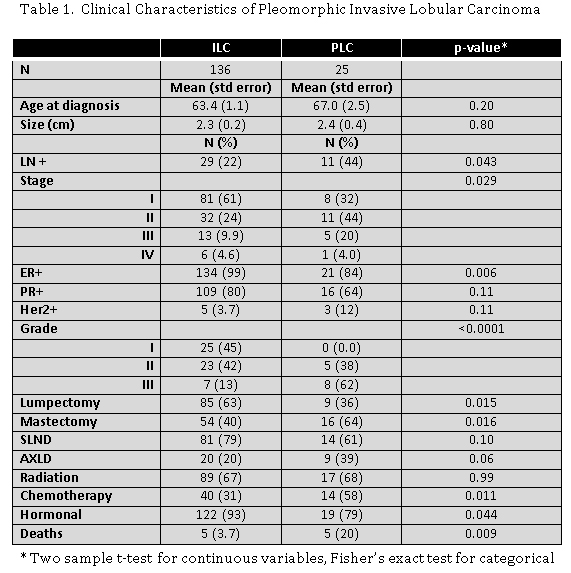Back to 2016 Annual Meeting Posters
Clinical and Genomic Characterization of Pleomorphic Invasive Lobular Carcinoma
B. Marie Ward, *Sha Zhu, *Jun Yu, *Lihua Julie Zhu, *Dina Kandil, *Keith Tomaszewicz, *Lloyd Hutchinson, *Shaw Leslie
University of Massachusetts, Worcester, MA
OBJECTIVE: To characterize the clinicopathologic behavior of pleomorphic invasive lobular carcinoma (PILC) and to identify unique genomic mutations associated with this lesion. PILC is an aggressive variant of classic lobular carcinoma (CILC) that presents at more advanced stages, greater risk of axillary metastasis, and higher mortality.
DESIGN: Single-institution retrospective cohort study
SETTING: Academic medical center
PATIENTS: Retrospective chart review of lobular carcinomas cases from 2008 to 2013 was completed. Clinical and pathologic data were collected on 136 CILC and 25 PILC cases. Median follow-up was 30 months. To identify genes mutated in PILC targeted exome sequencing of 12 PILC tumors and their respective normal control was performed using the Beijing Genomics Institute (BGI) TumorCare panel, which included 1053 cancer associated genes.
RESULTS: Our experience with PILC confirmed these patients present at advanced stages with regional metastasis warranting an AXLD, more likely to have a mastectomy, and had a higher fatality (CILC 3.7% vs PILC 20% P = 0.009). Our sequencing analysis identified genes that were repeatedly mutated in PILC including CDH1 (7 of 12 tumors), which encodes for E-cadherin, and PIK3CA (8 of 12 tumors), one of the most commonly mutated genes in cancer. Mutations in IRS2, DOT1L, PIK3R2 and ANKRD11 were detected in PILC but not CILC, which could represent PILC - specific genes.
CONCLUSIONS: PILC, an aggressive variant, presents at more advanced stages warranting more aggressive management. Identification of PILC-specific genes and signaling pathways could help target therapeutic interventions of PILC.

Back to 2016 Annual Meeting Posters
|
|
